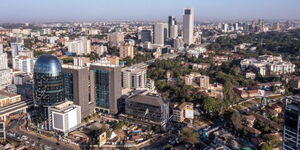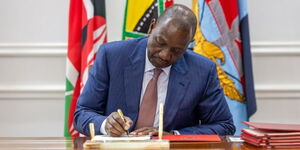High Court has ordered the Ministry of Interior and National Coordination to pay a foreigner from the Democratic Republic of Congo (DRC) over Ksh1.5 million in compensation and damages after unlawfully denying her entry into Kenya.
In the ruling, Judge Bahati Mwamuye ordered the government to pay the foreigner Ksh1.5 million in compensation for unfair discrimination and breach of the foreigner’s right to fair administrative action and Ksh184,756 in special damages for forfeited accommodation and travel expenditure.
Mwamuye also issued orders prohibiting the government from further violating her rights, including denying entry without proper reasons and engaging in discriminatory practices.
The foreigner argued that her rights had been violated following two denials of entry into Kenya on September 21, 2023, and October 2, 2023, respectively, despite holding valid travel documents, a round-trip ticket, and confirmed accommodation, and relying on the visa waiver agreement, which took effect from September 1, 2023.
Further, the foreigner alleged that she was subjected to unlawful and degrading treatment at Jomo Kenyatta International Airport and denied access to legal counsel, basic amenities, and administrative due process.
One of the elements in the visa-waiver agreement was free movement under the East African Community (EAC) Common Market protocol, which provides for the free movement of persons and workers among member states.
Kenya removed visa requirements for DRC nationals starting September 1, 2023, having reclassified the DRC from Category 2 to Category 1 under its visa classification system, with the DRC reciprocating in kind. In the agreement, nationals of each country would be allowed to stay up to 30 days in the other country.
In response, the government contended that while Kenya may waive visa requirements for nationals of certain countries, such waivers do not create an automatic or absolute right to enter Kenya. It argued that entry remained subject to statutory scrutiny and compliance with admissibility requirements at the point of entry, as outlined in the Citizenship and Immigration Act, 2011.
Further, the Interior Ministry noted that the foreigner had failed to meet essential entry conditions, particularly the requirement to demonstrate sufficient means of subsistence during her intended stay in Kenya. This was despite the foreigner asserting that she had at least Ksh64,400 ($500) in the bank that would be enough for her planned two-week vacation in Kenya.
According to the Ministry, immigration officers had reasonable grounds to be believe that the foreigner posed a potential risk to national interests.
While calling for the petition to be dismissed, the government maintained that immigration discretion was a sovereign function exercised in the national interest and that judicial intervention should be limited to instances of blatant disregard for the law, which, they argued, had not been demonstrated in the case of the foreigner.
They argued that the case was an erroneous interpretation of the visa waiver agreement between Kenya and the DRC, adding that the foreigner’s case would compromise Kenya’s sovereignty and its application of national immigration laws.
However, in response, the court found that there was no evidence that the visa waiver agreement altered or derogated from Kenya’s sovereign authority to control its borders.
“The agreement does not amend the Kenya Citizenship and Immigration Act, nor does it abrogate Section 33 thereof. The waiver must therefore be interpreted as facilitating ease of travel, not as diminishing Kenya’s sovereign powers or the constitutional responsibilities of immigration officers,” the ruling noted.
At the same time, the court found that the Ministry did not provide sufficient and specific reasons for the denial of entry, constituting a breach of the foreigner’s right to fair administrative action.












